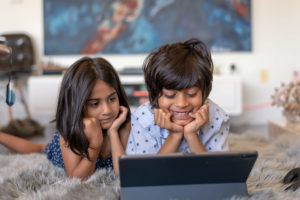Decisions about Screen Time
 Children and Screen Time
Children and Screen Time
With all of the technology advances being made it can be challenging to make decisions about how much time your child spends in front of a screen. Watching TV, playing video games, playing on the computer, or even using an iPhone are all considered screen time activities. Are you concerned about how much time your child spends in front of a screen? The effects of children and TV have been linked to obesity, irregular sleep, behavioral problems, impaired academic performance, and decreased play time. Research has found that television plays a limited role in learning. This is because children learn best from interactive, hands-on experiences. Specifically, touching, feeling, shaking, stacking, and problem solving with other people.
Screen Time Recommendations
The American Academy of Pediatrics recommends no television or screen media should be provided to children under the age of two. For children over the age of 2, the recommendation is 1-2 hours per day.
Research finds that television programs can even be detrimental. An article in TIME Magazine titled “Baby Einstein: Not So Smart After All” (Aug 6, 2007) discusses studies completed at the University of Washington. These studies found that “with every hour per day spent watching baby DVDs and videos, infants learned six to eight fewer new vocabulary words than babies who never watched videos. These products had the strongest detrimental effect on babies 8-16 months, the age when language skills start to form.”
In an article in the New York Times “Toddler’s Favorite Toy: iPhone” Jane M Healy, an educational psychologist in Vail, CO said: “Any parent who thinks a spelling program is educational for that age is missing the whole idea of how the preschool brain grows. What children need at that age is whole body movement, the manipulation of lots of objects and not some opaque technology.
You’re not learning to read by lining up the letters in the word ‘cat’. You’re learning to read by understanding language, by listening.”
Good and Bad TV: Research has also found that some children’s shows (such as Arthur, Clifford, Dragon Tales, Dora the Explorer, and Blue’s Clues) can have positive effects on children’s learning, however, other popular shows (like Teletubbies or Barney & Friends) do not. In general it is best to look for programs, which include:
- Television characters that speak directly to children occasionally
- Television characters that ask children to participate by repeating words
- Shows with a strong storyline which have a beginning, middle, and end
What You CAN Do:
- Talk about the program with your child. Ask what 2-3 year-olds liked or disliked, how it made them feel, and what they thought the show was about.
- Answer children’s questions. Sometimes children need help understanding new concepts to make sense of what they are seeing.
- Point out and name things they see on the screen.
- Be active while you watch – dance, hop, sing, jump or act like the characters.
- Connect what the child sees on TV to “real life” – “remember the garbage man on the TV show, here comes ours!”
- When the show is over, turn off the TV and act out the story.
Don’t use TV or videos to put your child to sleep. This makes it more difficult for them to learn how to fall asleep on their own. Young kids need love, safety and security that come from your routines (stories, back rub, songs). For more information to help you make decisions about screen time, check out this blog about how screen time affects language development.
